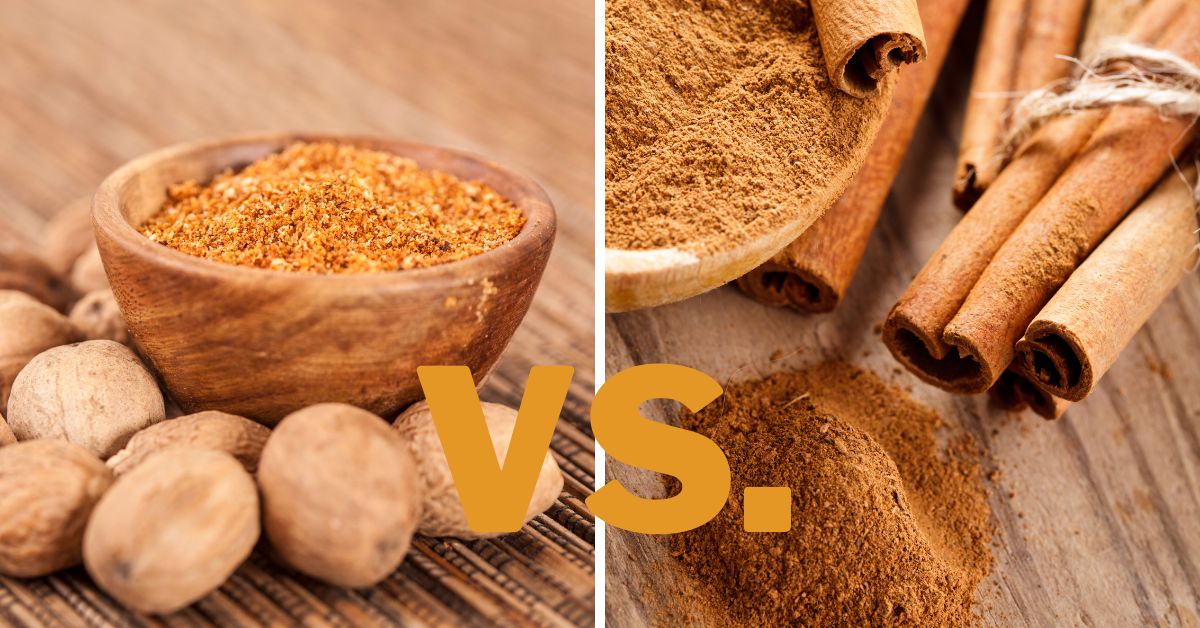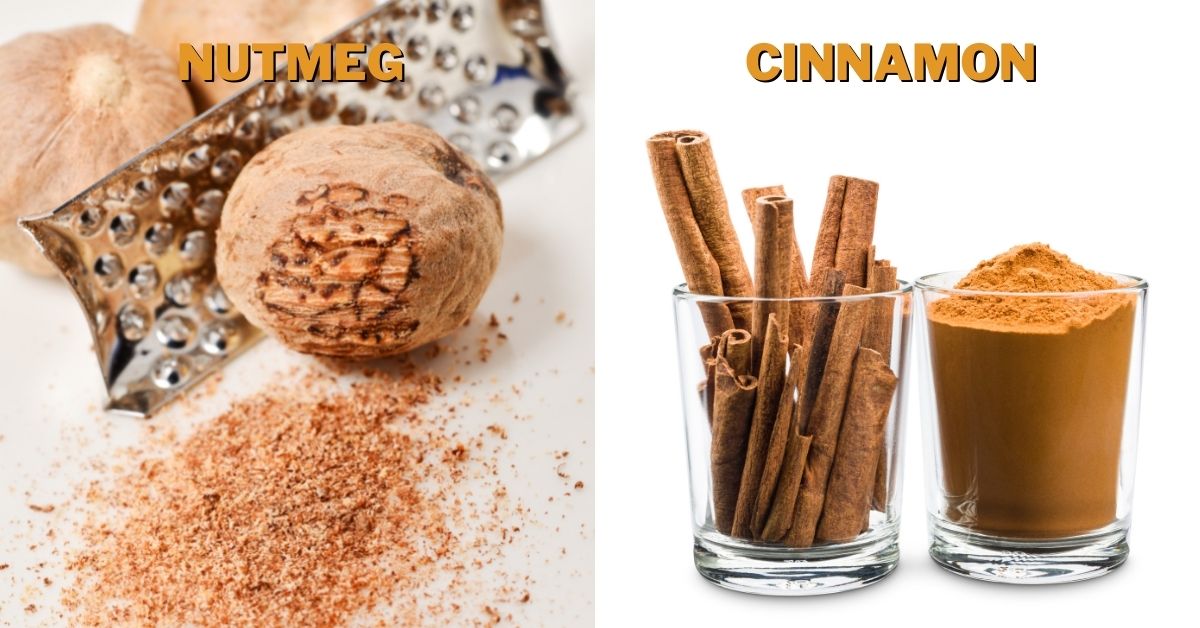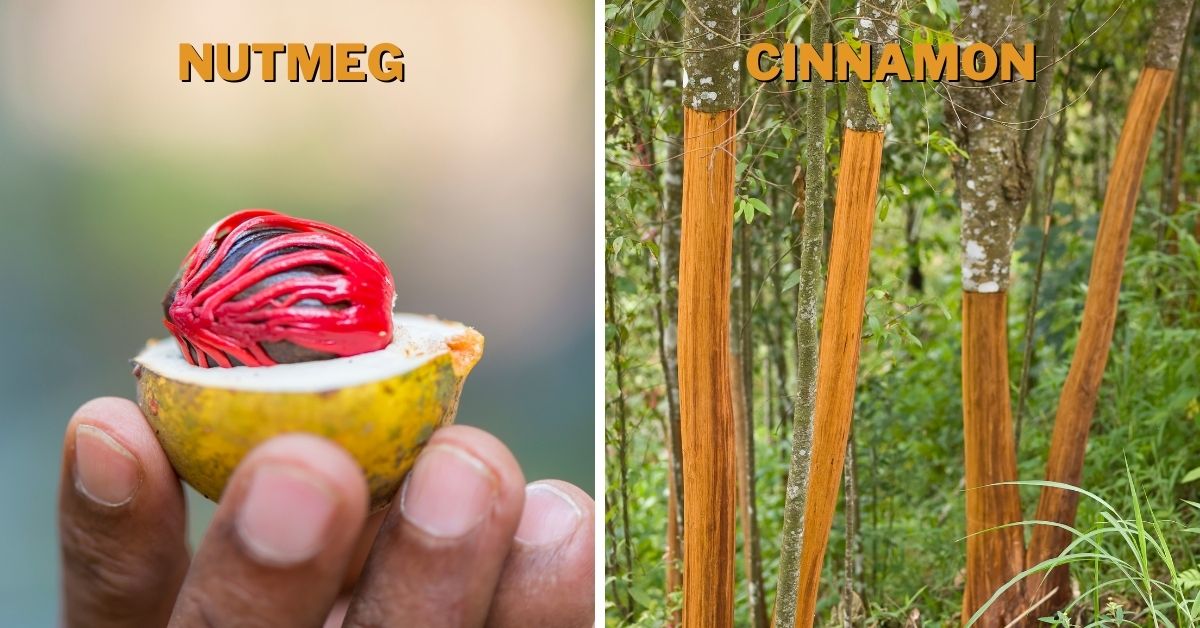Nutmeg vs. Cinnamon: Differences & Uses


Intense, flavorful, strong, and impactful, nutmeg and cinnamon are two of the most versatile spices, with a wide range of applications, especially in sweets, puddings, warm drinks, and alcoholic beverages. Both spices are very similar but different as well, so you will know which one you are tasting if you taste them separately, but in a dish or a beverage mixed with other flavors, you may not know which one you are having. So what are the differences between nutmeg and cinnamon?
Nutmeg is subtler than cinnamon and has a sweet, aromatic, spicy flavor and aroma. Cinnamon is stronger and warmer with an expressive spiciness that makes it very specific. Cinnamon is used in sweets, coffees, similar beverages, and alcoholic drinks, while nutmeg is a common part of savories.
Nutmeg and cinnamon are excellent spices and make a huge difference in the dish they are present. A simple coffee becomes a velvety and luxurious drink with a touch of cinnamon or nutmeg. Therefore, these two treasures deserve their own time in the spotlight, and in the following paragraphs, I will explain the differences between them and their uses.
Nutmeg vs. Cinnamon: Differences
Take a look at a cheat sheet before we start explaining.
| Nutmeg | Cinnamon | |
|---|---|---|
| Taste | Pungent and strong with a sweet aftertaste | Stronger and more intense than nutmeg, with a bitter flavor |
| Appearance | Comes in the form of a seed shaped like a combination between a nut and an almond | Comes a stick roll |
| Nutrition | Rich in vitamins and other nutrients, but contains more calories and fat than cinnamon. | Nutritious and very healthy |
| Uses | In beverages, sweets, and savory dishes | In beverages and sweet dishes. |
While cinnamon is made of the bark of the cinnamon tree, nutmeg is the seed of the evergreen nutmeg tree. Since they both come from similar origins, i.e., types of trees, nutmeg and cinnamon are bound to share some of their features, but the fact is that they are not the same spice, and they have many differences. Cinnamon comes in the form of a rolling stick, and nutmeg comes in the form of a seed. While you can crush cinnamon, you need to grate nutmeg.

Taste
While nutmeg is the tamer of the two, it is still a very intense and strong spice leaving an explicit sweet aftertaste. At first, the nutmeg spice is bitter, and as it dissolves, it becomes sweeter and gentler.
Cinnamon is the stronger of the two, with a very specific taste and aroma. It is the dominating taste wherever it is put, so many dishes have cinnamon in their names, even though the cinnamon is the ingredient of least quantity compared to the other ingredients contained in the dish. For example, the cinnamon bagels have only a touch of cinnamon and still taste explicitly like cinnamon.
When used separately, nutmeg and cinnamon envelop the dish with their charms, but when used together, the cinnamon overrules the nutmeg, rendering it almost unnoticeable.
Appearance
Cinnamon comes in the form of a rolling stick, and nutmeg comes in the form of a seed. While you can crush cinnamon, you need to grate nutmeg.
The cinnamon stick has very rich shades of brown and yellow, while the nutmeg seed is monochromatic and is a light brown shade. The shape of the nutmeg seed is somewhere between a nut and an almond and is not very large.
Because the nutmeg tree produces fewer seeds than the cinnamon tree has to bark around the trunk, the nutmeg spice is less available and more expensive than the cinnamon spice. Nevertheless, the nutmeg spice is widely available and affordable, but not as much as the cinnamon spice.

Nutrition
Both nutmeg and cinnamon are very beneficial spices having very positive health effects. Both are incredibly rich in nutrients, but nutmeg is higher in calories and fattier than cinnamon.
Both are very rich in minerals such as sodium, copper, calcium, zinc, potassium, phosphorus, and magnesium, as well as vitamins such as Vitamins D, A, K, B, C, and folate. [1]
Nutmeg and cinnamon also contain fiber and carbs, with the nutmeg being the one that has more.
Cinnamon and nutmeg are exceptionally nutritious and should be a part of your daily nutrition. Since cinnamon is very strong-tasting, you won’t be able to have too much even if you want to, but nutmeg can be a little sneaky since it is mild, so you can easily go overboard with it.
Nutmeg is known as a natural hallucinogen, and although you need to have nutmeg in astronomic quantities to trigger that effect, you should know this about it.
Uses
Both nutmeg and cinnamon are very versatile spices and very widely used. You can find them in beverages, such as coffees, milk, creamy non-alcoholic drinks such as hot chocolate, as well as in rum, eggnog, bourbon, hot wine, etc.
Cinnamon is also famous for its use in pastries, so here you have cinnamon bagels, cinnamon rolls, cinnamon buns, etc. It is also used in pies, such as pumpkin pie, cream pie, apple pie, etc. However, cinnamon does not work well in savory dishes, as it has an expressively sweet aroma, though it doesn’t taste sweet.
On the other hand, nutmeg is also used in sweets and drinks, just like cinnamon, but is also known for its use in savory dishes, such as roasted vegetables, fish, and pot roast.
Nutmeg and cinnamon are often used together, but I recommend using them separately, as the cinnamon tends to dominate the flavor and smothers the nutmeg flavor. Therefore, using them together would mean wasting the nutmeg, as it won’t be able to impact the dish with full capacity, which is a shame as it has much to offer.
Nutmeg vs. Cinnamon: Which Is Better?
Nutmeg and cinnamon are incredibly flavorful and nutritious spices, and saying that one is better than the other would be offensive to either one of them.
They have already established uses and signature dishes that would not work had these spices not given them some of their magic. Cinnamon and nutmeg are perfect additions to sweet non-alcoholic beverages, such as coffee, cocoa, or hot chocolate, and alcoholic drinks, such as rum, bourbon, or wine.
They both work excellent in sweets and puddings, but nutmeg is also used in savories. In contrast, the use of cinnamon is more restrictive due to its dominating taste and aroma, which doesn’t pair well with savory dishes.
In summation, if you are a fan of the more intense flavors, you should go for the cinnamon, and if you like the milder and tamer flavors, you should go for the nutmeg. Either way, you will enjoy it if you choose wisely what you prefer.
| Nutmeg | Cinnamon | |
|---|---|---|
| Porridge | Cinnamon goes better with porridge as it is a mild dish, so cinnamon gives it flavor. | |
| French toast | Nutmeg is the better option for French toast if you pair it with salty pairings. | Cinnamon is the better option for French toast if you pair it with sweet pairings. |
| Pancakes | Cinnamon works better with pancakes, even with salty pairings | |
| Tea | The tea is very mild and herbal, so it works better with nutmeg | Milk and tea work better with cinnamon |
| Coffee | Both work with coffee | |
| Lasagna | Nutmeg is far better for lasagna, as it is a savory dish. | |
| Pumpkin soup | Although cinnamon is very commonly used in pumpkin soup, I recommend the nutmeg, as there already is pumpkin spice in the soup. | |
| Rice pudding | Cinnamon is the better option. | |
| Banana bread | Cinnamon is the better option. | |
| Peach cobbler | Cinnamon works better | |
| Sweet potatoes | Nutmeg works better | |
| Carrot cake | Nutmeg is the better choice. |
Can You Replace Nutmeg With Cinnamon?
Since cinnamon is more restrictive in flavor and aroma than nutmeg, you cannot use cinnamon in all the cases where you would use nutmeg. Using cinnamon instead of nutmeg in drinks and sweets is ok, but using it in savories isn’t a good idea.
Can You Replace Cinnamon With Nutmeg?
You can replace cinnamon with nutmeg everywhere, as nutmeg is milder than the two and can double excellent for cinnamon. The dish or drink won’t taste the same, but it will still be delicious.
